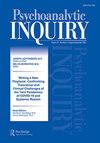The Dark Room Problem: Scapegoating and Audience Complicity in Twelfth Night
IF 0.5
4区 心理学
Q3 PSYCHOLOGY, PSYCHOANALYSIS
引用次数: 0
Abstract
ABSTRACT In Twelfth Night (1601–02), the pressure to enforce a comedic ending competes with problematic and overtly abusive behaviors towards certain characters, particularly the steward Malvolio, who is identified as a target for scapegoating by a persecuting group. As Malvolio is subject to mounting pressures to take in the projections of the group, the mistreatment levied against him gains in cruelty, culminating with his imprisonment in a dark room. While the “pranksters” seek to drive him mad, the figures in power ensure their own narcissistically satisfying ending, at the expense of those stripped of control and dignity. The role of the audience becomes a complex matter by the end, as applauding a problematic play meant to be funny invites a degree of collusion with those who would enforce scapegoating dynamics.暗室问题:《第十二夜》中的欺骗与观众共谋
摘要在《第十二夜》(1601-02)中,强制执行喜剧结局的压力与对某些角色的问题和公开虐待行为相竞争,尤其是管家马尔沃利奥,他被迫害团体认定为替罪羊的目标。由于马尔沃里奥承受着越来越大的压力,需要接受该组织的预测,对他的虐待愈演愈烈,最终导致他被监禁在黑暗的房间里。当“恶作剧者”试图把他逼疯时,当权者以牺牲那些被剥夺控制权和尊严的人为代价,确保了他们自己自恋的令人满意的结局。到最后,观众的角色变成了一个复杂的问题,因为为一部本应搞笑的有问题的戏剧鼓掌,会在一定程度上与那些实施替罪羊动态的人勾结。
本文章由计算机程序翻译,如有差异,请以英文原文为准。
求助全文
约1分钟内获得全文
求助全文
来源期刊

Psychoanalytic Inquiry
PSYCHOLOGY, PSYCHOANALYSIS-
CiteScore
1.00
自引率
33.30%
发文量
65
期刊介绍:
Now published five times a year, Psychoanalytic Inquiry (PI) retains distinction in the world of clinical publishing as a genuinely monographic journal. By dedicating each issue to a single topic, PI achieves a depth of coverage unique to the journal format; by virtue of the topical focus of each issue, it functions as a monograph series covering the most timely issues - theoretical, clinical, developmental , and institutional - before the field. Recent issues, focusing on Unconscious Communication, OCD, Movement and and Body Experience in Exploratory Therapy, Objct Relations, and Motivation, have found an appreciative readership among analysts, psychiatrists, clinical psychologists and a broad range of scholars in the humanities.
 求助内容:
求助内容: 应助结果提醒方式:
应助结果提醒方式:


